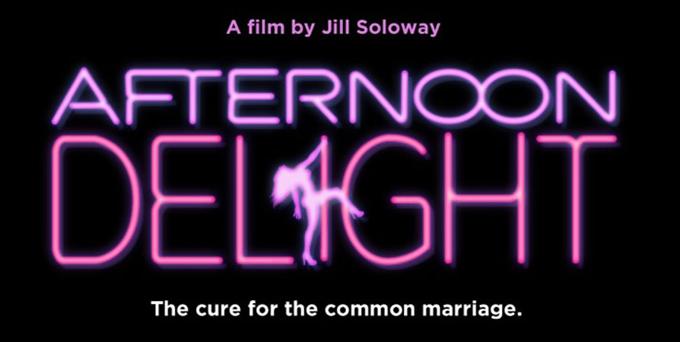
This is a guest post by Heather Brown. [contains spoilers]
Let’s face it: many of us feminists will pay lip service to sex workers’ rights while at the same time hold within us a mess of conflicting feelings around the subject. In fact, many of us are probably a bit more repressed about sex than we’d care to admit. The idea that there are women who voluntarily seek out such work has long been a feminist conundrum. But perhaps the bigger problem is the paternalistic impulse of feminists trying to rescue sex workers. Jill Soloway, the writer and director of Afternoon Delight, knows this all too well. As she says in an interview about the film, “It’s not just about rescue. If you’re into rescue go rescue the garment workers. It’s about amping up your own relationship to your own shame around sex.”
Here’s the story: a bored woman named Rachel (Kathryn Hahn) lives in a bright, airy Silver Lake, L.A. home with her app-designing husband and toddler. Rachel doesn’t work but busies herself with event planning and local charities linked to her local Jewish Community Center. We see her in therapy sessions, spinning her wheels to justify and normalize her ennui (“Six months, no sex…I feel like there are a lot of couples who go through dry spells.” Her therapist, played by a wry Jane Lynch, replies, “Not healthy couples”). Her best friend, Stephanie (Jessica St. Clair), suggests that Rachel go to a strip club for a change of pace. She says of she and her husband: “We go there, get all hot, and then we bang each other when we get home.” Then, a night out with friends at a strip club finds her face-to-face with a young woman named McKenna (Juno Temple), who delivers Rachel a lap-dance at the behest of her husband. She’s sufficiently discomfited, but her curiosity is awakened.

It’s Rachel’s curiosity that leads her back to the neighborhood of the strip club in the sober light of day, where she happens to see McKenna in the midst of one of those breakups where everything you own ends up in the trunk of a car and strewn on the sidewalk. Rachel invites McKenna to stay with her for a few days, and then offers her the long-term gig of being her live-in nanny. Soon, Rachel learns that McKenna is more than a stripper when McKenna reveals matter-of-factly, “I’m a full service sex worker.” This knowledge changes Rachel’s posture toward McKenna, and she tells her, “If you want out of that life, I can help you.” So it begins: Rachel attempts to take McKenna under her wing, but as the film progresses, we start to wonder exactly who most needs being saved—and all signs point to Rachel.
While the film crescendos with a big “uh-oh” scene, the most compelling moments are those in which women are sharing experiences of raw, ugly honesty. These are instances when shame is pulled back, and we see the guts and blood of their perfectly curated lives. Two scenes are especially haunting (you won’t see these in the trailer).

In the first, Rachel accompanies McKenna on a call to one of her clients. This is a man who enjoys having another woman watch him while he is having sex with McKenna, and Rachel tells her she wants to do it. Rather than giving us just a taste of what happens in a before-and-after editing sequence, Soloway brings us into the room to watch Rachel watch McKenna on the job, as it were. The camera holds the gaze of the client, an overweight middle-aged man with ample body hair, who remains fixed on Rachel as he climaxes with McKenna sitting on top of him.
To me, what’s most troubling is the way that Rachel regards McKenna afterward. She becomes withholding, and in a symbolic rejection, prevents McKenna from babysitting a large group of her friends’ kids so they can have a ladies’ wine night. Rachel blames McKenna for what she has now learned about herself—which is a dehumanizing act. Yet, Kathryn Hahn imbues such a degree of sympathy to the performance that we can almost forgive her. This brings me to the second scene.

Ladies’ wine night: as the night begins, women are talking, laughing, over-sharing in ways that are funny and blunt. Soon, the teeth become wine-stained and—yep—out pours Rachel’s shame. When Stephanie reveals that she’s pregnant (no wine for her), Rachel’s first response is that this now means she’s going to be the only one among them with just one child. Later, as she’s drunker and drunker, Rachel weeps and self-flagellates for never printing out any of the photos of her child (she only has them on the “cloud”).
What I find so amazing about these two scenes (and don’t worry, there’s plenty I didn’t spoil) is that they show how Rachel is so desperate to reveal herself, to be intimately known. But when confronted with someone like McKenna—who is in the business of doing this and lot more—she can’t handle it.

I was reminded of another film after I saw this one: Elles (2011), in which Juliette Binoche plays a journalist writing a profile of French student prostitutes. She becomes involved in their world to an extent that it complicates her relationship to her bourgeois married, family life. There seems to be a subgenre of films featuring women who reckon with—or perhaps imagine—the role of the sex worker. While this can make for intriguing and rich storytelling, I can’t help but wonder what would happen if we made sex workers the subject, rather than the object.
Heather Brown lives in Chicago, Ill., and works as a freelance instructional designer and online writing instructor. She lives for feminism, movies, live music, road trips, and cheese.
